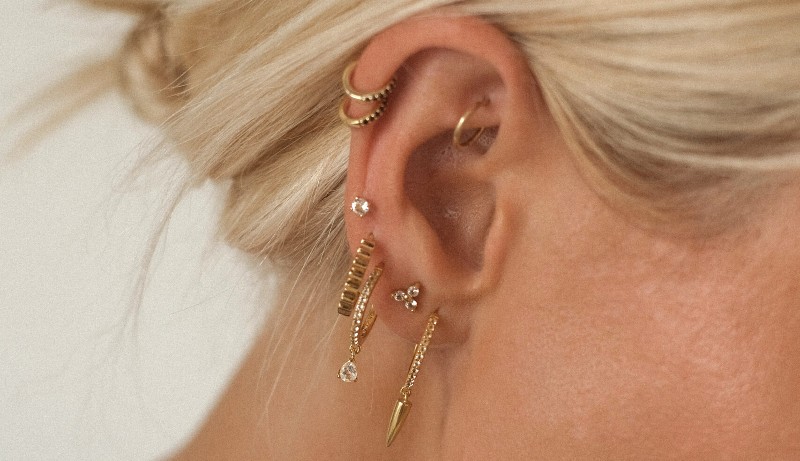When considering ear piercing in Dubai( ثقب الأذن في دبي), one of the most important factors to think about is the type of metal used in the jewelry. Allergic reactions to certain metals can cause discomfort, inflammation, or even infections, making it essential to choose safe materials. Whether you are getting your first piercing or adding a new one, understanding which metals are hypoallergenic and skin-friendly is crucial to avoid allergic reactions and ensure a smooth healing process.
Common Allergens in Ear Piercing Jewelry:
Nickel is the most common allergen found in many inexpensive or low-quality earrings. It can cause allergic contact dermatitis, characterized by itching, redness, and swelling. Other metals like cobalt and chromium also trigger allergies in some individuals. Awareness of these common allergens helps piercers and clients select jewelry that minimizes the risk of irritation.
Hypoallergenic Metals to Consider:
Titanium and surgical-grade stainless steel are among the most recommended metals for ear piercing due to their hypoallergenic properties. Titanium is lightweight, durable, and rarely causes allergic reactions, making it an excellent choice for sensitive skin. Surgical stainless steel, especially grades 316L and 316LVM, is widely used in professional piercing studios for its safety and resistance to corrosion.
The Benefits of Gold and Platinum:
High-quality gold, typically 14k or higher, and platinum are also safe options for those prone to allergies. These metals are less likely to cause reactions, provided they are free from nickel alloys. It’s essential to avoid gold-plated or low-karat gold jewelry as these often contain other metals that can irritate the skin. Platinum, though more expensive, is highly biocompatible and ideal for long-term wear.
Why Avoid Cheap or Fashion Jewelry:
Many fashion or costume jewelry pieces are made from base metals coated with nickel or other alloys that wear off over time, exposing the skin to allergens. These can cause allergic reactions and infections, especially in new piercings. Choosing jewelry from reputable sources with clear information on metal content is crucial for safe ear piercing experiences.
The Role of Coatings and Platings:
Some jewelry is coated with rhodium or other protective platings to reduce allergic reactions. While coatings can provide a temporary barrier, they may wear off with time, especially if exposed to moisture or friction, eventually exposing allergenic metals. For piercings, especially fresh ones, it’s better to choose solid hypoallergenic metals rather than relying solely on coatings.
Signs of Metal Allergies After Piercing:
Allergic reactions to ear piercing metals typically manifest as redness, itching, swelling, blistering, or crusting around the piercing site. Persistent discomfort or discharge can indicate an allergy or infection. Identifying these signs early allows for prompt removal of the offending jewelry and appropriate treatment to prevent complications.
How to Test for Metal Allergies Before Piercing:
Patch testing is a reliable method to check for metal sensitivities. A dermatologist can apply small patches containing different metals to the skin and observe for reactions over several days. If you plan on getting ear piercing ( ثقب الأذن) and have a history of metal allergies, consulting a professional for testing can help select safe jewelry and avoid complications.
Professional Piercing Practices in Dubai:
In Dubai, many piercing studios prioritize safety by using only certified hypoallergenic metals and maintaining strict hygiene standards. Choosing a reputable studio ensures that you receive not only professional care but also quality jewelry that minimizes allergy risks. Always inquire about the metals used and ask for recommendations if you have sensitive skin.
Caring for New Piercings to Avoid Allergic Reactions:
Proper aftercare plays a vital role in preventing allergic reactions and infections. Keeping the piercing clean, avoiding harsh chemicals, and refraining from changing jewelry too early helps the skin heal without irritation. Using saline solutions and following piercer instructions can significantly reduce the chances of adverse reactions.
Alternatives for Those with Severe Allergies:
If you have severe metal allergies, consider alternatives such as biocompatible plastic or silicone jewelry designed specifically for sensitive skin. These materials are less likely to cause irritation and can be used during the healing phase or even for long-term wear. Always discuss these options with your piercer to find what suits your needs best.
Final Thoughts:
Choosing the right metal for ear piercing is essential, especially for those with sensitive skin or allergies. Whether you opt for titanium, surgical steel, gold, or platinum, ensuring the jewelry is genuine and hypoallergenic can prevent uncomfortable reactions and promote healthy healing. Ear piercing in Dubai offers access to professional studios equipped with high-quality materials and expert advice to guide you through a safe piercing experience. By understanding the risks and making informed choices, you can enjoy your new piercing without the worry of allergic complications.

